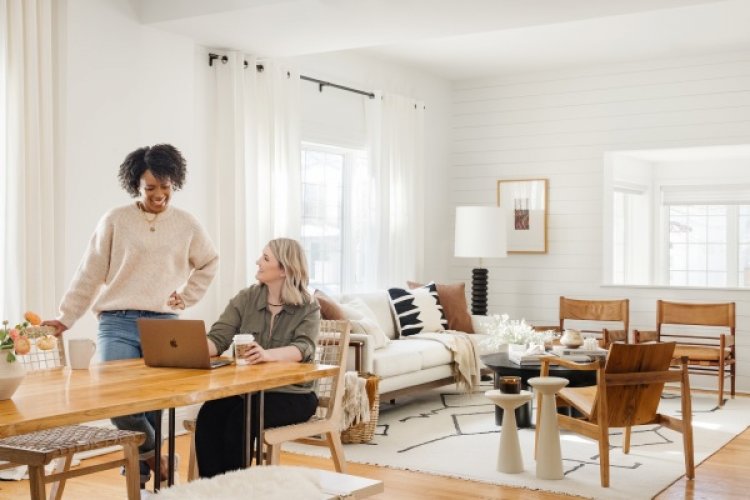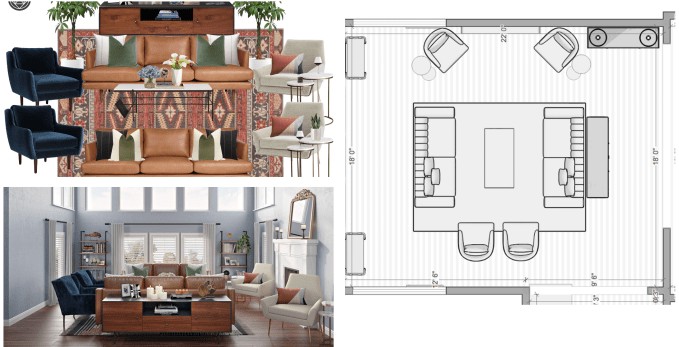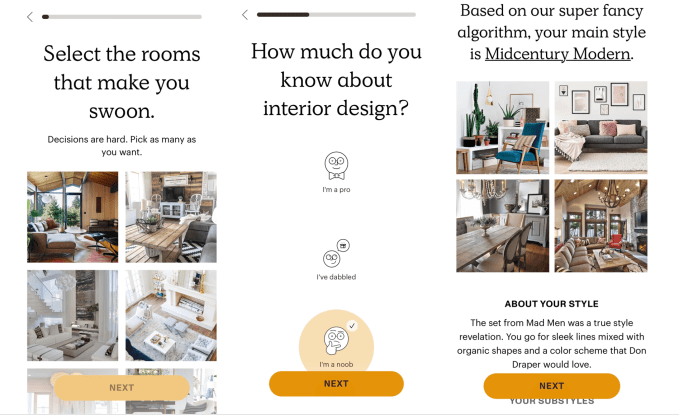Interior design startup Havenly introduces IRL services
A digital interior design startup that’s been offering online services is bringing its interior design expertise into the real world. Havenly, a Denver, Colorado-based company, founded in 2014, is today launching “Havenly At Home” — an at-home offering that allows clients to work with their chosen interior designer in person. Lee Mayer, Co-Founder and CEO […]

A digital interior design startup that’s been offering online services is bringing its interior design expertise into the real world. Havenly, a Denver, Colorado-based company, founded in 2014, is today launching “Havenly At Home” — an at-home offering that allows clients to work with their chosen interior designer in person.
Lee Mayer, Co-Founder and CEO of Havenly, said in a statement, “Our expansion responds to the requests of our customers over the years, adding in-person services to deliver an enhanced design experience for our customers and addresses a market typically overlooked by other models.”
TechCrunch spoke with Lee Mayer about the overall business, technology, and the decision to explore in-home services.
According to Mayer, when Havenly began to test in-home services, the company saw a significant amount of demand, specifically with its Gen Z and Millennial audience. This generation of newer homeowners and renters is typically beginning to invest in their living spaces. Havenly’s services address the wants of younger consumers (20s-early 40s) who may not have the budget for luxury brands and high-priced traditional interior designers that charge you approximately $2,000 to $12,000.
Meanwhile, Havenly is giving its customers early access pricing of $499 ($200 off) for the first room design and $199 for each additional room. This is a little bit pricier than Havenly’s digital service ($79-$179) since the interior designers will meet the client face-to-face in their home.
The e-commerce platform is connected to hundreds of retailers for clients to make direct purchases on furniture and other products. It also has a network of vetted interior designers who create custom visual designs based on the client’s unique style choices.
With a combination of a communication platform, recommendation software, and visualization software, clients are able to message designers one-on-one, purchase products online, and see photorealistic designs using Occipital– which creates 3D models of real-world spaces and objects then converts them to computer-aided design (CAD).
Marrying digital with Havenly’s new in-person service will attract a wider audience who want extra personal attention and service. At launch, these in-person services are now available in Atlanta, Austin, Chicago, Dallas, Denver, Houston, and New York City, and the company has plans to expand anywhere from 20 to 30 cities nationwide in the next 12 months.
The biggest difference about Havenly’s in-home services is that the designer will tour your space IRL, take measurements, and make sure that everyone is on the same page before they send over a virtual design through digital layouts and 3D renderings.
Mayer told TechCrunch, “We’re trying to bring a more modern approach to interior design where you can take the benefits of online shopping, online communication, texting, and messaging and also still meet with your designer and walk them through your space… So take the traditional experience, power it with a lot of technology and our designers to hopefully provide something that’s still accessible and affordable but combining a more traditional, high-touch experience.”
This is a more streamlined process than the traditional model because it considers users’ busy schedules and doesn’t make them travel across town to a showroom. A curated shopping list is provided on the Havenly platform and keeps track of your orders all on one bill rather than across numerous retailers and sites. Once everything is delivered, the designer will come back to the home and help with the layout.
IRL or online, the process to a well-designed room begins the same. After taking a style quiz, Havenly matches you with an interior designer. If you aren’t too sure about the one that the algorithm chose, you can look at a long list of other options. There are over 200 screened professional designers, and each one is tested for style and technical ability.
However, before you can even speak to the designer or have a consultation, you are instructed to pay the fee, which could seem like a gamble to some. Luckily you can look at their profile info which includes a photo, design samples, an in-depth bio, an introduction video, and reviews from clients.
While the digital experience is accessible, it does have its drawbacks. Based on a few customer reviews alone, Havenly’s app was seen as unreliable in one customer’s opinion, as the product images wouldn’t load on her device. Also, the interior designer that she worked with didn’t respond in a timely manner and pushed back deadlines. Another verified buyer expressed frustration with the time-consuming process but admitted that they could have been clearer with what they wanted.
Revisions and refunds are possible, so if you truly hate it, then the only thing you’d really be losing is time. In addition, the designer can work with you for up to a month, depending on how large the project is. After the design is accepted, they can answer any follow-up questions for 2-4 weeks.
It’s also important to note that the maximum room size for a Havenly design project is 400 square feet, so that could be a possible issue for some clients.
The majority of the feedback was positive, though, and upon further inspection, we found that the app is easy-to-use, basic in design, and has your run-of-the-mill tech that a lot of these types of businesses use (Decorilla, Modsy, etc.).









